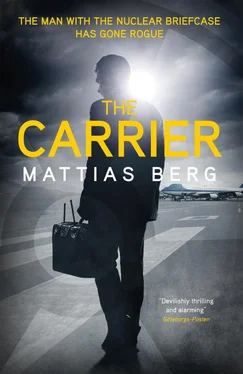Mattias Berg - The Carrier
Здесь есть возможность читать онлайн «Mattias Berg - The Carrier» весь текст электронной книги совершенно бесплатно (целиком полную версию без сокращений). В некоторых случаях можно слушать аудио, скачать через торрент в формате fb2 и присутствует краткое содержание. Город: London, Год выпуска: 2019, ISBN: 2019, Издательство: MacLehose Press, Жанр: Триллер, на английском языке. Описание произведения, (предисловие) а так же отзывы посетителей доступны на портале библиотеки ЛибКат.
- Название:The Carrier
- Автор:
- Издательство:MacLehose Press
- Жанр:
- Год:2019
- Город:London
- ISBN:978-0-85705-788-4
- Рейтинг книги:4 / 5. Голосов: 1
-
Избранное:Добавить в избранное
- Отзывы:
-
Ваша оценка:
- 80
- 1
- 2
- 3
- 4
- 5
The Carrier: краткое содержание, описание и аннотация
Предлагаем к чтению аннотацию, описание, краткое содержание или предисловие (зависит от того, что написал сам автор книги «The Carrier»). Если вы не нашли необходимую информацию о книге — напишите в комментариях, мы постараемся отыскать её.
The Carrier — читать онлайн бесплатно полную книгу (весь текст) целиком
Ниже представлен текст книги, разбитый по страницам. Система сохранения места последней прочитанной страницы, позволяет с удобством читать онлайн бесплатно книгу «The Carrier», без необходимости каждый раз заново искать на чём Вы остановились. Поставьте закладку, и сможете в любой момент перейти на страницу, на которой закончили чтение.
Интервал:
Закладка:
Before leaving I bought a box of Bruegel pastilles, some postcards of his most gloomy works, and I reached for a magic Bruegel cube, with which one could switch between ten or so famous paintings: for example change the tranquil “Hunters in the Snow” into the macabre and violent “The Fall of the Rebel Angels”. As I walked out I could hear the young girl sigh with relief.
The rain fell heavily again, cascaded over the medieval square like a great flood. As I stepped through the entrance to the Bruegelhuis, Peer’s exhibition dedicated to its most famous son, the drops from my rain suit streamed onto the creaking floorboards. My legs felt shaky and unreliable on the dizzyingly steep stairs. Not only because I had wanted to come here for so long, the place where, according to the experts, Pieter Bruegel the Elder was born. Apart from the base, it seemed to be the only thing which justified Peer’s existence. And I had always thought of getting away for a free hour during one of our training visits, although the opportunity had never arisen.
Once I got into the exhibition upstairs at the Bruegelhuis, I was alone. This would be the obvious rendezvous in Ingrid’s mind. She had been fascinated by him first. Started her opening lecture to us with “The Triumph of Death”—and concluded our final dissertation session with “The ‘Little’ Tower of Babel”.
It was in the immediate aftermath of 9/11, 2001, our world had been turned upside down. Ingrid did not seem to want to talk about my dissertation at all. Instead she showed me the viral images on the net, with Bin Laden or the Evil One’s face in the cloud of smoke caused by the aircraft crashing into the World Trade Center. Then she opened an image of “The ‘Little’ Tower of Babel” on her computer. Clicked to zoom closer and closer in, highlighting how the black clouds in the top right-hand corner of Bruegel’s painting really seemed to be coming out of the building: in the form of smoke or soot. As if something had crashed into that work too, from the side, before exploding against Babel’s tower.
Here in front of the reproduction of that painting I switched on the audio guide. But the meditative voice did not say a single word about it, hardly referred to the strange black clouds.
I moved on and found myself standing there, my legs trembling under the weight of my body. Somewhere behind the thick velvet curtains I could sense the sounds from the square, life at lunchtime on St Lucia’s day, Friday the 13th, in this small Belgian village with Bruegel and a nuclear weapons base as its claims to fame. I put the headphones back on. “ Pling . Number 23. ‘The Triumph of Death’. Bruegel’s prophetic masterpiece…” Stood stock-still in the dark room, just let myself be sucked in. For one minute, three, maybe longer.
When I surfaced again and switched off the audio guide, I heard an unmistakable creaking from the flooring in the next room. Somebody was there, keeping more or less exact pace with me: a few times I tried suddenly stopping in front of one of Bruegel’s paintings and the footsteps would continue for just a second or two too long. I breathed calmly through my nose. Almost inaudibly, as we had been trained.
But the person shadowing me, or at least keeping me under observation, always from one of the adjoining eerily dark rooms in the Bruegelhuis, seemed to be well trained. So nobody gave themselves away—and neither did I. It could just as easily be Zafirah, Ingrid or Jesús María.
Then I heard a soft, for most people imperceptible, click from the entrance door lock on the ground floor. The careful tread up the stairs revealed neither the person’s gender nor their weight. Could have been a compact little woman with perfect control over her center of gravity or a large man. What I knew was that this was someone who had been trained to move with stealth in tight situations: presumably at the same school as me.
Back at the tourist bureau, after triple-locking the door to the Bruegelhuis—neither the hunter nor the hunted revealing their play—I asked the young woman:
“Are there more sets of keys to the house?”
“Of course, sir, why do ask?”
“Who was it who picked up the other ones? Sex, age, any distinguishing marks? Could I possibly see a copy of their passport?”
She stared at me, terrified, as if this were a police interrogation.
“Nobody’s been here. Not a living soul since you. Not in this weather!”
She managed a little smile.
“Maybe it was our house ghost you heard. We call him ‘the Spirit of Bruegel’.”
I gave her a long look, this naïve young woman, hardly more than a teenager, in her Limburger folk dress. I knew that everyone could be bought—or threatened.
“I can believe that,” I said.
4.05
After a long and late lunch—I tried to get through a gigantic entrecôte cut from a Belgian Blue—and then a tedious wait after that, in and out of shops, the taxi came and collected me outside the hotel.
The rain was once again beating against the windows of the taxi, and only got worse as we approached the base. I stared out at the volumes of water biblically drenching the sidewalks along the roadway. Focused, meditated, with the key sentence as my dark mantra. “I love you… just as senselessly as my pretty weird and hellish father, for the time being and onward into eternity, Amen.”
The driver got an excessive tip just for not asking any more questions, even though I was arriving later than almost everyone else. Once he had driven off, I put on a wig, mustache and beard in the shelter of the crowd. Despite the heavy rain there were more people outside the base than I had ever seen at similar events: tens of thousands, perhaps even reaching the dream target of one hundred thousand. Ordinary families with balloons twisted into the shape of F.16s with the words “SPOTTERS’ DAY. Kleine Brogel 2013” on the wings. Enthusiasts and spies equipped with similar rainwear and tall rubber boots.
The activists, on the other hand, rarely had any equipment apart from their signs and streamers. So far they were being allowed to do much as they wanted. Even scribble all over the posters for the event on the perimeter fencing: “BOMB Spotters’ Day”, “NUCLEAR Spotters’ Day”.
Any signage relating to nuclear weapons had been tidied away prior to the event. By granting the public and the media access to the American base for the very first time, our military administration would meet two objectives: “proving” that there were no nuclear warheads on the base while keeping the activists one additional barrier away—the entrance had been set up by the outer gates, where anyone without a ticket would be stopped. According to the information signs, security procedures would be more stringent than at a civilian airport. Scanning and body search for everybody, no exceptions.
I stood still in the pelting rain, tugged the hood over my head while the lines wound their way forward, and pondered how I was going to make my way past the guards. Even the morass of activists were closer to the fence. A bizarre set piece, as necessary as it was mad, began to unfold.
The P.R. balance was delicate. Public opinion was usually our best friend—especially for the last ten years or so during which time the media hardly reported anything about the ongoing nuclear escalation, our new generation of weapons and carriers, the “Revitalization”. But at any time the balance could tip the other way, as happened during the Vietnam War.
The guards could have bundled up this many activists in a few short minutes, and without for using anything heavier than batons. “But there is also a balance between common sense and sensibility,” Edelweiss used to preach. A quick move against the idealistic youth around the perimeter fence, many of them still teenagers, would result in too much negative publicity. Destroy the P.R. value of the event in one go.
Читать дальшеИнтервал:
Закладка:
Похожие книги на «The Carrier»
Представляем Вашему вниманию похожие книги на «The Carrier» списком для выбора. Мы отобрали схожую по названию и смыслу литературу в надежде предоставить читателям больше вариантов отыскать новые, интересные, ещё непрочитанные произведения.
Обсуждение, отзывы о книге «The Carrier» и просто собственные мнения читателей. Оставьте ваши комментарии, напишите, что Вы думаете о произведении, его смысле или главных героях. Укажите что конкретно понравилось, а что нет, и почему Вы так считаете.












